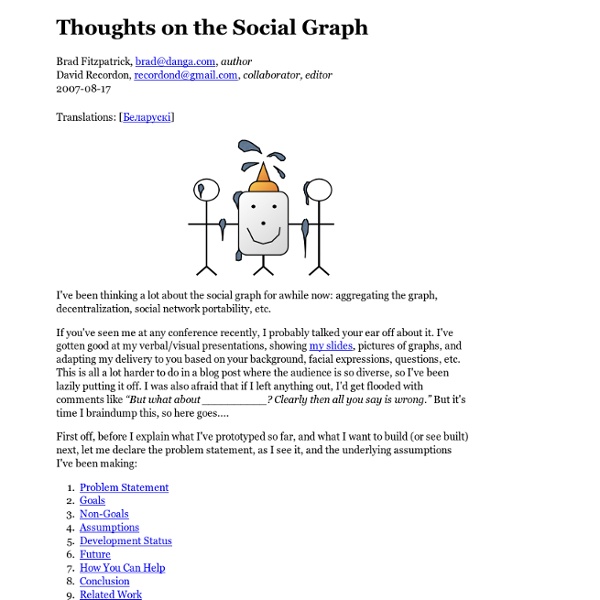OrgScope Layers map complex organization networks
The hierarchy of positions is the “ground truth” terrain of the organization, zoom-able “down” to the unit person scale. Every position’s “altitude” in the organization is given by its level, indicated by a color scheme or a level number, which gives the jobs in the organization their “elevation.” OrgScope produces an organizational relief map of an inherently 3-D structure
Google Buzz: Economic Surveillance - Buzz Off! The Problem of Online Surveillance and the Need for an Alternative Interne
I wrote this text for a longer paper about online surveillance that will be included in the collected volume “The Internet & Surveillance” that I am editing together with Kees Boersma, Anders Albrechtslund, and Marisol Sandoval as part of the EU COST Action “Living in Surveillance Societies” (see The book will be published in 2011. In February 2010, Google introduced a new social networking service called Buzz. Buzz is directly connected to GMail, Google’s webmail-platform. Google’s introduction of Buzz is an attempt to gain importance in the social networking sites-market that has been dominated by Facebook and Twitter.
Pull down the walled gardens
Internet law professor Michael Geist says the walled gardens of social networks should be pulled down. Social networking sites such as Facebook and MySpace have become part of the daily routine for millions of internet users. The popularity of these networks, however, has resulted in an unfortunate by-product - the mushrooming number of requests that come from dozens of these sites. While not quite spam, the steady stream of requests for Facebook friends, LinkedIn connections, Dopplr travellers, or Plaxo contact updates, highlights the lack of interoperability between social network sites and significantly undermines their usefulness. The interoperability issue is likely to become more prominent in the months ahead as hundreds of specialty social networking sites, covering virtually every area of interest from dogs to cooking, jostle for new users.
Have the Data Wars Begun
Robert Scoble reports that Facebook has kicked him off their site, citing that it appears he was running a script. In their letter, Facebook says, In addition, please confirm with us that in the future you will not scrape or otherwise attempt to obtain in any manner information from our website except as permitted by our Terms of Use, and that you will immediately delete and not use in any manner any such information you may have previously obtained. I’d just read the article in Wired about scraping, and the ways companies were building businesses around taking data from a service and building a product around it. This is something I haven’t fully formed an opinion on, because it just seems so fragile. If the “mother ship” company scuttles your effort, you’re out of luck pretty quickly.
If You Were a Terrorist, How Would You Attack?
The TSA recently announced that most airplane carry-on restrictions will stay in place for at least another year, until new X-ray technology has been fully installed. Surprisingly, one item that will now be permitted on board is a lighter. While it seems crazy to keep people from bringing toothpaste, deodorant, or water on a plane, it doesn’t seem so strange to ban lighters, which could be used to start fires. I wonder whether the lighter manufacturers were lobbying for or against this rule change — on the one hand, having 22,000 lighters confiscated per day would seem good for business; but on the other hand, maybe fewer people will buy lighters if they can’t travel with them. Hearing about these rules got me thinking about what I would do to maximize terror if I were a terrorist with limited resources. I’d start by thinking about what really inspires fear.
Using BibTeX
Create your BibTex-File Just create a plain text file and apply what has been explained in section BibTeX File Format. Example: @misc{ Nobody06, author = "Nobody Jr", title = "My Article", year = "2006" } Create your LaTeX-File \documentclass[11pt]{article} \usepackage{cite} \begin{document} \title{My Article} \author{Nobody Jr.}
Viewing American class divisions through Facebook and MySpace
danah boyd June 24, 2007 Citation: boyd, danah. 2007. "Viewing American class divisions through Facebook and MySpace ."
Geo-Names
About GeoNames The GeoNames geographical database is available for download free of charge under a creative commons attribution license. It contains over 10 million geographical names and consists of over 8 million unique features whereof 2.8 million populated places and 5.5 million alternate names. All features are categorized into one out of nine feature classes and further subcategorized into one out of 645 feature codes.
Chapter 1
Thinking About Thinking Of the diverse problems that impede accurate intelligence analysis, those inherent in human mental processes are surely among the most important and most difficult to deal with. Intelligence analysis is fundamentally a mental process, but understanding this process is hindered by the lack of conscious awareness of the workings of our own minds. A basic finding of cognitive psychology is that people have no conscious experience of most of what happens in the human mind. Many functions associated with perception, memory, and information processing are conducted prior to and independently of any conscious direction.



